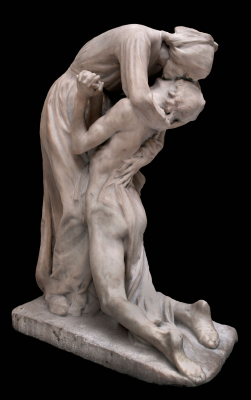Gospel in Art - In your prayers do not babble as the pagans do

Forgiveness by Pieter Braecke 1893 © The Royal Museum of Fine Arts, Brussels
Source: Christian Art
Gospel of 8th March 2022 - Matthew 6:7-15
Jesus said to his disciples: 'In your prayers do not babble as the pagans do, for they think that by using many words they will make themselves heard. Do not be like them; your Father knows what you need before you ask him. So you should pray like this:
'Our Father in heaven,
may your name be held holy,
your kingdom come,
your will be done,
on earth as in heaven.
Give us today our daily bread.
And forgive us our debts, as we have forgiven those who are in debt to us.
And do not put us to the test,
but save us from the evil one.
'Yes, if you forgive others their failings, your heavenly Father will forgive you yours; but if you do not forgive others, your Father will not forgive your failings either.'
Reflection on the Sculpture
During Lent, we all probably pray a little more. Or even if we don't pray more, we maybe concentrate a little harder when we do pray, to enter deeper into the spirit of Lent. In today's reading Jesus teaches us how to pray. He tells us that words are not sufficient! He places forgiveness centre stage. We have to forgive others, otherwise the words we pray are empty. Forgiving others can sound like a cliché. We have heard these words so often that they have lost their poignancy. So today can be a day to reflect on what it actually means to forgive others. Is there anyone we need to forgive in our hearts? Anyone we are simply not being very generous towards?
Forgiveness is ultimately about goodness and extending kindness towards someone else. A sculpture which captures this beautifully is this marble by Belgian artist Pieter Braecke. It depicts a man pleading for forgiveness. He is kneeling in front of a woman who extends a warm embrace over him. We don't know if this is mother and son, or wife and husband, or simply two friends. The sculpture, titled Forgiveness, conveys the suffering of the man. He is in an uncomfortable pose, bending backwards, semi-naked, on his knees, barefooted. He comes to her in all brokenness. But his hands, the most important focus of the sculpture, are what convey the begging for forgiveness. They are hands of forgiveness, hands of prayer.
We can barely see the woman's face, as she is so close to the man. But we can feel the goodness of her heart. Her embrace, her forgiveness would transform the relationship between them. Prayer techniques can be practised and prayer habits can be taught, but ultimately we are called to let our hearts talk to God. And our hearts will be shaped not just by words but by forgiveness and our acts of kindness.
LINKS
Today's story - https://christian.art/en/daily-gospel-reading/1106
Christian Art - www.christian.art


















